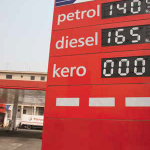Africa’s biggest oil producer
Nigeria relies heavily on its oil revenues to the detriment of its other abundant resources.
Petroleum is Nigeria’s largest industry and main generator of income. The government, however, is trying to reduce the country’s dependence on petroleum. In 2000, for example, oil accounted for 98% of export earnings and 40% of GDP while today it accounts for nearly 90% of export earnings and 30% of GDP.
Oil exploration in Nigeria dates back to the late 1800s, when early explorers recorded a few successes but eventually abandoned their search. It wasn’t until 1956 when Nigeria’s vast oil resources were finally revealed by Anglo Dutch Shell and then Shell D’Arcy. The first significant oil discovery was made in Oloibiri, located in the Ogbia local government area of Bayelsa State in South–South Nigeria. Since then, the Niger Delta has become a beehive of exploration activities.
Today the petroleum industry is Nigeria’s largest industry and main generator of income. Oil accounts for nearly 90% of export earnings and 30% of its GDP. In 2000, oil accounted for bigger share of the economy (98% of export earnings and 40% of GDP) indicating that government efforts to reduce its skewed dependence on petroleum seem to be working.
Oil reserves and production
Nigeria’s oil is mostly located in the onshore Niger Delta, which also include the inland basins of Anambra, Benue, Chad, Borno, Benin and Dahomey. It is also found in shallow and deepwater offshore regions. Nine states have oil reserves including Rivers, Bayelsa, Akwa Ibom, Delta, Imo, Abia, Ondo, Edo and Cross River states, all found in the Niger Delta.
As of 2011, the country’s proven oil reserves are more than 37 billion barrels. The country produces some 2.4 million barrels per day (bpd), making it the largest producer in Africa. A member of the Organisation of the Petroleum Exporting Countries (OPEC), Nigeria is the world’s 8th largest exporter of crude oil, with the US it biggest market importing 42% of the country’s oil exports.
Nigeria wants to increase oil reserves to 40 billion barrels and daily production to 4 million bpd respectively. Although these targets were set for 2010, they were not reached because of years of civil unrests and militancy in the oil producing Niger Delta. But with the success of the government’s amnesty program these targets are once more back on track.
For example, Nigeria and Sao Tome (an island nation located off the coast of Nigeria in the Gulf of Guinea) recently signed an agreement in which a Joint Development Authority was created to explore and produce oil in the waters between Sao Tome and Nigeria, called the Joint Development Zone, or JDZ. This area could contain 14 billion barrels or more of oil.
JOAs
Most of Nigeria’s oil operations are under joint operating agreements (JOAs). There are six JOAs with the Nigerian National Petroleum Corporation (NNPC), the national oil corporation. The NNPC holds a 60% stake in all the JOAs except in the Shell JV where it has a 55% stake. Shell Petroleum Development Company of Nigeria (SPDC) – is the largest privatesector oil and gas company in Nigeria. Most of the other majors, including Chevron, ExxonMobil, Total, Agip and Texaco, are in JOAs.
All parties (to a JOA) share in the cost of operations. Each partner can lift and separately dispose its interest share of production subject to the payment of Petroleum Profit Tax (PPT) and Royalty.
Under JOAs, operators prepare proposals for the annual work program and expenditure in accordance with shareholding. Each party can opt for and carry on sole risk operations. Technical matters are discussed and policy decisions are taken at operating committees where partners are represented on the basis of equity holding.
Nigeria’s biggest oil producer is Shell Petroleum which accounts for more than 40% of the country’s oil production. Shell’s biggest project is the Bonga deepwater project with a capacity of 200,000 bpd. Other major producers are Mobil, Chevron, Total, Agip, and Texaco.
PSCs
Production Sharing Contracts (PSC) are the preferred fiscal operation for oil companies in Nigeria. PSC agreements were created in response to the funding problems faced by the old JOA arrangement as well as the desire of the government to open up the sector for more foreign participation.
All new participants in the new inland deep and ultra-deep water acreages came in under the PSC. Costs are recoverable with crude oil in the event of a commercial find, with additional benefits from tax oil, cost oil and profit oil. Companies that come in under PSCs include: Statoil, Snepco, Esso, Total, Agip, Addax, Conoco, OMEL, Stirling, Sahara, Oando, Petrobas, Star Deep Water, Chevron, Oranto and Philips.
PIB
The Petroleum Industry Bill (PIB) seeks to harmonize all other previous laws, about 15 of them, guiding oil and gas operations in Nigeria. The bill has struggled to attain relevance since the industry reform began in 2000 under the Oil and Gas Industry Committee (OGIC), which pieced the initial bill together. Due to contentions over some fiscal terms the bill has remained stuck in the National Assembly for the past six years.
“An investment-friendly bill will enable substantial long-term investment in the industry,” says Chike Onyejekwe, Managing Director of Shell Nigeria, which operates the Shell Bonga deepwater project, who also notes that the non-passage of the PIB is frustrating future investments in the upstream sector.
Diezani Alison-Madueke, Nigeria’s petroleum minister, identifies huge investments opportunities in the industry in the areas of engineering design and related services, petroleum engineering services, fabrication and construction, pipe mills, equipment leasing, civil works, logistics and haulage, financial services, legal services, as well as hospitality services for industry workers.
“An enabling environment for investment is important and we are continually evolving to adapt to the challenges of the time,’’ Diezani Alison-Madueke says.
In harmonizing the existing laws, the PIB also seeks to streamline the functions of the various agencies that regulate Nigeria’s oil and gas operations.
For more information:
Nigerian National Petroleum Corporation (NNPC)
National Petroleum Investment Management Services
(NAPIMS)
Department of Petroleum Resources (DPR)
Petroleum Products Pricing Regulatory Agency
(PPPRA)
Nigerian Content Development Management Board
(NCDMB)
National Petroleum Research Center
Petroleum Technology Development Fund (PTDF)
Petroleum Equalisation Fund (PEF)
Too good to ignore
Despite the negative publicity Nigeria attracted because of militancy and civil unrests in the Niger Delta, some companies still came into Nigeria’s petroleum industry, such as UK-quoted Afren, an independent exploration and production company. Afren was created in 2004 by five founders, including three Nigerians.
DBI: Why did Afren invest in Nigeria during the unrest?
Adebayo Ayorinde: Nigeria has always been a key focus point and at the very heart of the company. On the most fundamental level, Nigeria is the most prolific oil and gas producing nation in Sub-Saharan Africa and accounts for around 80% of proved oil and gas reserves that have been discovered to date across the region. The sheer scale of the resource base and availability of numerous partnership opportunities, coupled with our strong ties and Nigerian management, meant that Nigeria held an instant appeal for us as a place to do business.
DBI: What assurances did you get from the government?
AA: Afren’s decision to invest in Nigeria was driven by the business opportunities we knew to exist, rather than any specific assurance or communication from the government, but the government’s focus over the last 10 years on trying to deepen indigenous production has contributed to the success of our business model.
DBI: Afren has a large portfolio of assets. What is the driving force?
AA: Our asset base in Nigeria is more mature and commercially advanced. We have existing production at Okoro and Ebok and we have strong technical knowledge of the surrounding areas where we are also investing in exploration and appraisal wells in 2012. Fundamentally, we believe that the opportunity set in Nigeria for Afren remains exceptional. Having proven our partnership model with Amni and Oriental, and expect average daily production of between 42,000 to 46,000 bpd from our existing asset base in 2012. When you consider that 37% of the oil and gas licenses in Nigeria are held by indigenous companies, but only 4% of those are currently producing oil, then the opportunity is clear for further growth.
DBI: What has been Afren’s experience since investing in Nigeria?
AA: Given the success of our operations our experience has generally been very positive. Afren was founded with the objective of supporting the indigenous sector and so the value add that we bring to Nigeria can be quantified in a number of ways. Firstly, simply by providing the access to finance and technical support required for indigenous companies to achieve production we are supporting the growth of the indigenous sector in the upstream oil and gas sector in Nigeria. Secondly, Afren has had a clear policy since it was founded to build capacity in the countries where we operate. We do this in a number of ways. Internally, 95% of our permanent staff in Nigeria is Nigerian and we are very proud of this. Of the 95% of the Nigerian staff on our facilities, about 40% are local indigenes of those communities.
DBI: What success have you had since being in Nigeria?
AA: Since we were established in 2004, Afren has successfully completed two world class projects in Ebok and Okoro, grown an asset base across the country, extended our partnership model into direct investment into the indigenous sector and are now positioned for strong production and reserves growth from our existing portfolio in 2012. We are already the leading independent upstream oil and gas company operating in Nigeria and Nigeria remains at the center of our development plans.
DBI: What are your challenges and how did you overcome them?
AA: Nigeria can sometimes be a challenging place to do business, but the combination of our local knowledge, access to finance and strong technical team have allowed us to overcome any challenges that we have faced. Our business model means that we secure assets often overlooked by the majors and implement innovative and fast developments to deliver value as quickly as possible.







